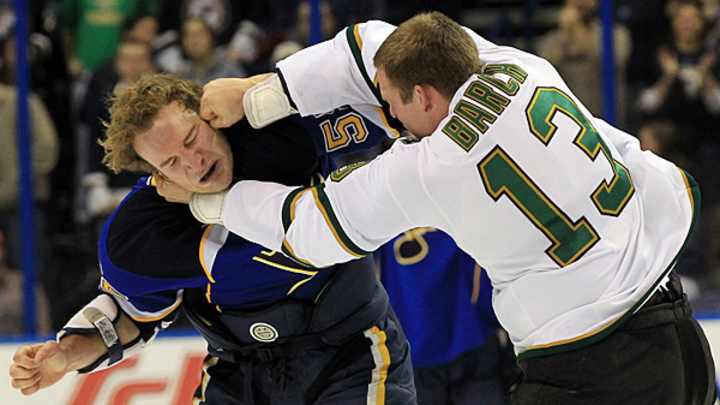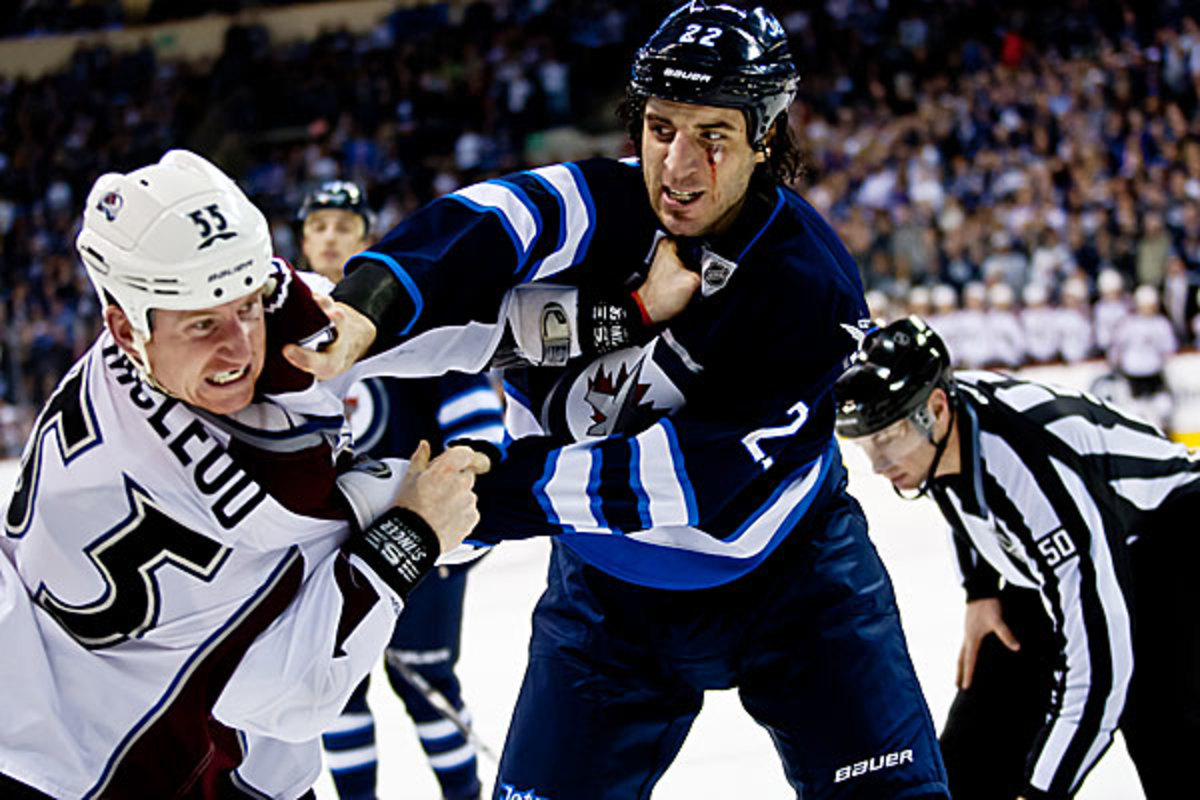Flaws clear in NHLPA-Hockey Night poll

Not all hockey fights are the same and this complex issue deserves more than a "yes" or "no" answer. (Terry Lee/Icon SMI)

By Stu Hackel
There's lots to chew on in the annual NHLPA/CBC's Hockey Night in Canada Players' Poll, the results of which were made public over the weekend. Pavel Datsyuk was pretty much acclaimed as the NHL's best player, Zdeno Chara the best defenseman, and Henrik Lundqvist the best goalie. The players say they think the Canucks are overrated, the Blues are underrated, that they'd love to play for the Blackhawks, they love playing at Montreal's Bell Centre, and the Penguins Dan Bylsma is the coach they'd most like to play for.
There's lots more, of course, but let's stop to consider the issues-oriented questions in the poll, namely those on fighting and the instigator rule. There are some serious problems here, and they start with the questions themselves.
Here's video from Sunday of the discussion of the poll's wider findings during the Hockey Night telecast of the Devils-Canadiens game.
About a third of the players responded to the poll, and that's a very strong sample size, but some teams abstained from participating as did a number of individual players. People who do audience measurements and such for a living say that without knowing who did and didn't answer, it's hard to know if this sample size is an accurate representation of the NHLPA membership as a whole. But it is what we have and we're glad to have it.
As for the specific questions that concern us here, the poll reveals that 98 percent of those who responded said they were opposed to fighting being eliminated from the NHL. That's unchanged from last year's finding. And that makes for a great headline. But the players were responding to the question "Should fighting be completely banished?"
Fighting in hockey is a complicated issue, and for a complicated issue, that's a pretty simple question. In fact, it's oversimplistic.
Fighting in hockey serves a few different functions and takes place in a variety of ways. For example, what about staged fights? A number of wise hockey people have advocated that the league crack down on them -- and a rule curtailing them came close to being adopted a few years ago. Shouldn't any survey of opinion on fighting reflect the difference between a fight that occurs spontaneously from the action of the game and one that is agreed upon by two players who feel they have to go right off a face-off, either because they want to fire up their teams or because they believe that is what is expected of them?
What about all the highly publicized mounting evidence that blows to the head from fighting can lead to concussions, and repeated concussions can cause permanent brain damage? Does all this have an effect on how players think about the issue of fighting? Shouldn't the players also be asked something like, "Do you fear that absorbing punches to the head in hockey fights will one day impair your or your teammates' ability to live a normal life?"
Earlier this season, we looked at one single fight in which the Capitals' Jay Beagle got pummeled by the Penguins' Arron Asham. It was a pretty infamous tussle in which Beagle was knocked out and concussed and Asham was roundly criticized for his mocking pantomime of putting Beagle to sleep. We counted eight different perspectives that could be expressed about that single fight, what it meant to advocates and opponents of fighting -- and, in the case of people like Ken Dryden, those who don't even frame the issue as pro- or anti-, but see it as the same thing as when a player concusses another from a targeted elbow or shoulder to the head.
When eight different perspectives can be taken in one single incident, to merely lay it out there as "Fighting - yes or no?" doesn't do the issue justice. It doesn't really get into the depths of what the players might really be thinking about this issue.
The same thing goes for the instigator, one of the most misunderstood rules in the game. The survey showed that 53 percent favor keeping it as it is, and that total declined from last year when 66 percent of the players were in favor. But the simple yes or no posing of the question belies some of the complexities involved in the rule.
The whole discussion of the rule (which allows for a minor, major and 10-minute misconduct, as well as a suspension for accumulating three instigator infractions), revolves around the aspect of the penalty that punishes players for avenging previous wrongs. If a player cheap-shots an opponent, the accepted brand of NHL frontier justice is that the cheap shot artist should be made to pay -- and not just by being penalized and perhaps suspended by the league, but by being physically attacked by the victim's team.
But that's only part of the instigator rule. It's not the reason the rule came into being in the first place and the question is framed to call for the end of the rule as a whole.
As we've written before, the genesis of the instigator is in the 1970s, the NHL's darkest hours (and the legacy of that time is still being felt today). It prohibited a team from sending its goons out to engage an opponent's star player for the purpose of getting him off the ice, if not just beating him up and injuring him. Most people date the instigator rule to the version adopted 20 years ago that made the misconduct and suspension aspect mandatory. But it's more than that. Get rid of the instigator rule and you run the very real risk of inviting that thug mentality back into the game.
It's uncertain that the respondents to the poll recognize what getting rid of the instigator rule would fully mean and the question doesn't account for that.
Apart from that, just how short are the collective memories of those NHL players who favor dumping the rule? Have they already forgotten, how, just eight years ago, the Vancouver Canucks and Todd Bertuzzi specifically, attacked Steve Moore, who had previously concussed Canucks' captain Markus Naslund with a blindside hit?
It was one of the game's most disgraceful incidents (and it is still being litigated). Is that the sort of conduct they want to legalize?
It's a mystery how the CBC's Hockey Night group and the NHLPA -- who both have very bright people on their staffs working for the betterment of the game -- can formulate these questions in such a superficial fashion. They're not doing the respondents any favors nor are they really aiding in the general public's understanding of player sentiment.
Of course, not everyone at Hockey Night understands nuance when it comes to fighting, as Don Cherry once again demonstrated on Saturday night. You'd hate to think that Hockey Night's marquee talent was driving the way the poll questions are posed.
On his Coach's Corner segment, Cherry sneered at the Red Wings for what he perceives as their lack of toughness compared to the Rangers, Bruins and Canucks (the quartet of teams he believes will make it to the conference championships).
"Detroit...doesn't fight at all!" howls Cherry. "They're not tough!" Well, that settles it. Don Cherry has spoken: If the Wings don't fight, they'll have a hard time beating any of those three teams.
We talked about Detroit's team toughness a couple of weeks ago, and Gregg Krupa of The Detroit News, who is a fan of Cherry's, wants to take issue with him on this as well.
"Toughness surely is Justin Abdelkader not backing down from bigger, more experienced fighters, as he did again Sunday, against the Sharks," Krupa wrote in today's paper. "But toughness also is Abdelkader delivering the heavy hip check that led to the fight.
"Toughness is Danny Cleary playing for two months on a painful knee, before finally shutting down and then trying to play again, tonight. It is Henrik Zetterberg playing against the Predators and Sharks while receiving treatment for an apparent bad back.
"It is Jimmy Howard stuffing his fractured index finger into a wrap, brace and padding, so he can play again. Toughness is Joey MacDonald finding a spot on the Red Wings' roster, at age 32, after years of riding the boards in the AHL, and kicking around the NHL."
But for Cherry, toughness only equals fighting majors. It's all very simple for Cherry: Fighting is good. It's what the people want. It's good for the game and the teams who fight the most will do the best. The Wings still are atop the NHL, however, so he's got to find some way to be critical of the Wings and their "Europeans.'"
Jeez, some people never change.
Well, no sense getting too worked up over this. It's Mardi Gras, after all. And Fat Tuesday, like all Tuesdays, is our hockey night here at Red Light. The old ECHL New Orleans Brass sweater gets hauled out every Mardi Gras. Then post-game, we'll all head down to the Grille where they're cooking up some jambalaya. If there's any fighting, it'll be in the NHL highlights on the flat screens above the bar.
COMMENTING GUIDELINES: We encourage engaging, diverse and meaningful commentary and hope you will join the discussion. We also encourage, but do not require, that you use your real name. Please keep comments on-topic and relevant to the original post. To foster healthy discussion, we will review all comments BEFORE they are posted. We expect a basic level of civility toward each other and the subjects of this blog. Disagreements are fine, but mutual respect is a must. Comments will not be approved if they contain profanity (including the use of punctuation marks instead of letters); any abusive language or personal attacks including insults, threats, harassment, libel and slander; hateful, racist, sexist, religious or ethnically offensive language; or efforts to promote commercial products or solicitations of any kind, including links that drive traffic to your own website. Flagrant or repeat offenders run the risk of being banned from commenting.
